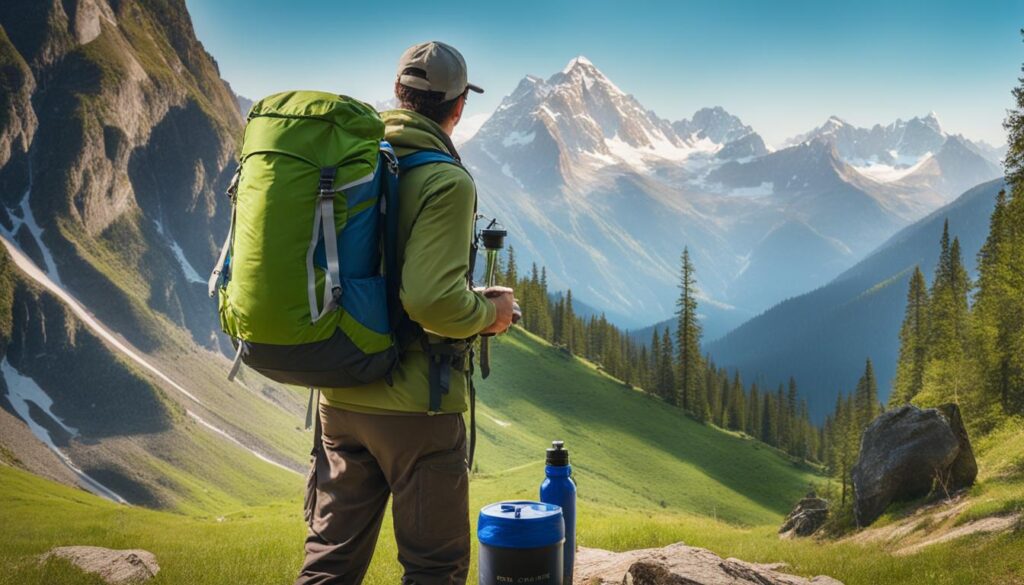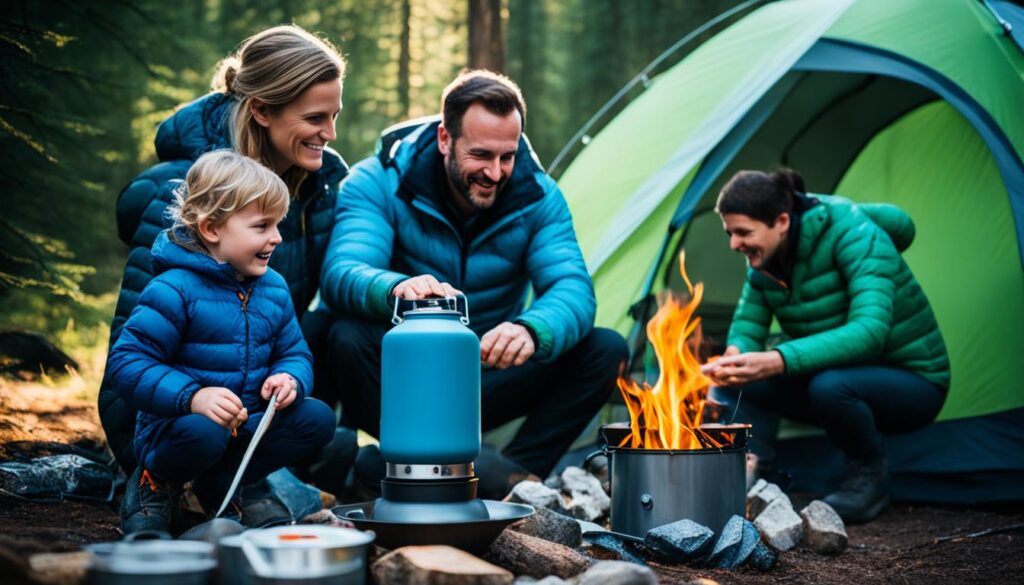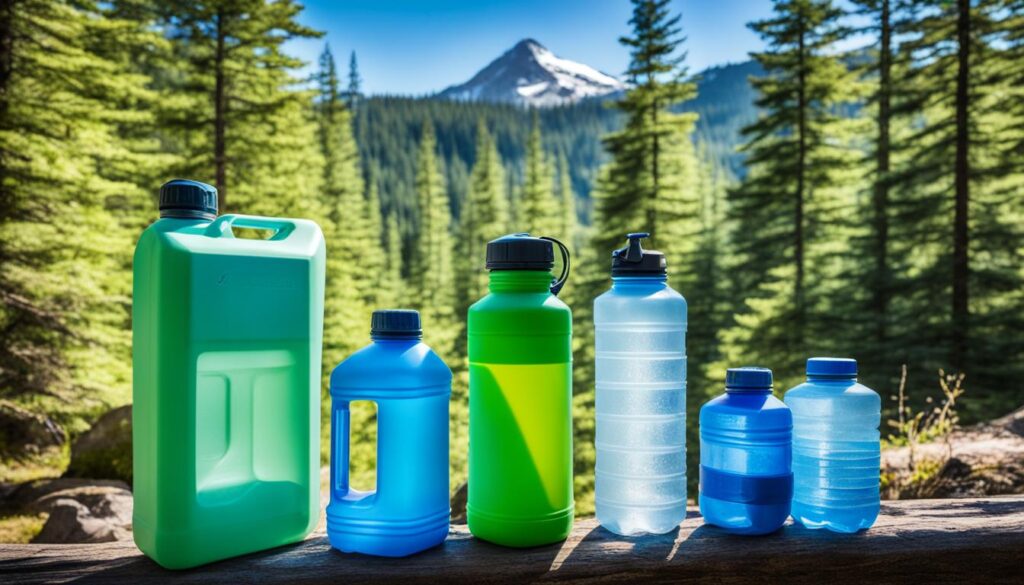When going on a camping trip, it is crucial to know how much water to bring to ensure proper hydration and a successful adventure. The amount of water you need to bring will depend on several factors, including the type of camping, the number of people, and the duration of your trip. By understanding the camping water requirements and considering various factors, you can plan and pack the right amount of water to stay hydrated and enjoy your camping experience to the fullest.
Key Takeaways:
- Bringing approximately 2 gallons or 7.5 liters of water per person per day is a general rule of thumb for car camping.
- For backpacking, it is recommended to bring enough water for each day, about 64 ounces or 2 liters per person, and use a water filter to refill at water sources along your route.
- Consider factors such as climate, planned activities, and the specific needs of children and dogs when determining water requirements.
- Bring at least one gallon or 3.7 liters of drinking water per person per day to ensure adequate hydration.
- You will also need water for cooking and cleaning. Plan on using 1-2 cups of water per person for cooking and have at least 72 ounces or 2 liters of water per person per day for cleaning.
How Much Water to Bring for Drinking
Adequate hydration is essential while camping. The general recommendation is to bring at least one gallon or 3.7 liters of drinking water per person per day. This amount may vary depending on the climate, physical activity level, and individual needs. It is better to bring more water than not enough to avoid dehydration. Remember to drink water regularly throughout the day, even if you don’t feel thirsty, as thirst is not always an accurate indicator of hydration status. Make sure to have reusable water bottles or other containers to store and carry your drinking water.

Importance of Adequate Water Intake
Staying hydrated while camping is crucial for your overall health and well-being. The human body relies on water for various essential functions, including regulating body temperature, lubricating joints, aiding digestion, and transporting nutrients. When camping, factors such as increased physical activity, exposure to the elements, and sweating can lead to a higher water intake requirement.
Proper hydration not only helps prevent dehydration, but it also supports optimal cognitive function, muscle performance, and overall energy levels.
Tips for Staying Hydrated
Here are a few tips to ensure you stay properly hydrated while camping:
- Drink water regularly throughout the day, aiming for a steady intake.
- Carry a reusable water bottle or hydration reservoir to make it easy to drink on the go.
- Set reminders or establish a hydration schedule to monitor your water consumption.
- Include hydration breaks during activities or outdoor excursions.
- If you’re camping in hot or dry climates, increase your water intake to compensate for increased sweating.
- Avoid excessive consumption of caffeinated or alcoholic beverages, as they can contribute to dehydration.
- Consider using electrolyte-enhanced drinks or adding hydration-enhancing supplements to your water.
Monitor Your Hydration Status
It’s important to monitor your hydration status while camping to ensure you’re adequately hydrating and avoid complications from dehydration. Signs of dehydration can include increased thirst, dry mouth, fatigue, dizziness, dark urine, and decreased urine output. If you experience these symptoms, increase your water intake and seek shade or a cooler environment to lower your body temperature.
| Activity Level | Recommended Water Intake (Gallons) |
|---|---|
| Light activity and mild climate | 1-2 gallons |
| Moderate to intense activity and/or hot climate | 2-4 gallons |
| Extreme conditions or high altitude | 4+ gallons |
Remember, each person’s water needs may vary, so it’s important to assess your individual hydration requirements based on factors like body weight, activity level, and climate conditions.
Water for Cooking and Cleaning
In addition to ensuring an adequate supply of drinking water, it is important to consider your water needs for cooking and cleaning while camping. These activities require water, and planning ahead can help ensure you have enough water for all your camping adventures.
Water for Cooking
When it comes to cooking while camping, the amount of water needed will depend on several factors, including the number of people and the type of meals being prepared. As a general guideline, plan on using 1-2 cups of water per person for cooking. This includes water for boiling, simmering, and rehydrating ingredients. Whether you’re making a simple one-pot meal or a more elaborate camping feast, it’s essential to have enough water for all your cooking needs.
In addition to the water used for cooking the food, don’t forget to account for water needed to rehydrate dried food items, such as soups, stews, and dehydrated meals. These foods require water to make them palatable and nourishing. Remember to read the instructions on food packaging to determine the necessary amount of water for rehydration.
Water for Cleaning
Keeping clean and maintaining good hygiene while camping is crucial. You’ll need water for activities like brushing teeth, washing your face, and other personal hygiene routines. It’s recommended to have at least 72 ounces or 2 liters of water per person per day for cleaning purposes.
Using biodegradable soap can help minimize the impact on the environment while ensuring cleanliness. Be mindful of water conservation techniques, such as turning off the tap when not in use and using minimal amounts of water for each activity. These practices can help stretch your water supply and reduce waste.
To summarize:
| Activity | Water Requirement |
|---|---|
| Cooking | 1-2 cups per person |
| Rehydrating dried food | Follow package instructions |
| Cleaning | 72 ounces or 2 liters per person per day |
Remember, proper water management is crucial when camping. Planning and estimating your water needs for cooking and cleaning will help ensure you have enough water for a comfortable and enjoyable camping experience.

Considerations for Different Camping Types
When it comes to camping, the amount of water you need may vary depending on the type of camping you’re doing. Whether you’re hiking, car camping, or engaging in dry camping or boondocking, it’s important to plan your water consumption while camping to ensure you have enough supply for your trip.
Hiking and Backpacking
For hiking and backpacking trips where you need to carry all your water, it is recommended to bring at least two liters of water per person per day. This amount ensures you have enough water for drinking, cooking, cleaning, and personal hygiene while keeping in mind the weight and space limitations of your backpack.
Car Camping
If you’re car camping, you have the advantage of bringing more water with you. However, consider the available space in your vehicle and aim to bring at least three liters of water per person per day. This will provide enough water for all your camping needs, including drinking, cooking, cleaning, and personal hygiene.
Dry Camping or Boondocking
Dry camping or boondocking refers to camping in areas without water hookups. In these situations, it is crucial to bring an ample water supply. Plan to bring around four liters of water per person per day to ensure you have enough for drinking, cooking, cleaning, and personal hygiene. Research and plan accordingly based on your specific camping type and needs to ensure you have an adequate camping water supply.
“Proper preparation and planning are key when it comes to water consumption while camping. Consider the type of camping you’re doing and plan your water needs accordingly.”

Having enough water while camping is crucial for staying hydrated and maintaining a successful outdoor adventure. By considering the type of camping, whether hiking, car camping, or dry camping, you can plan and pack an appropriate amount of water to meet your camping water needs. Remember, water consumption while camping is essential for your health and well-being, so be prepared and enjoy your camping experience to the fullest!
Impact of Weather and Climate
The weather and climate conditions can significantly impact your water needs while camping. When camping in hot and dry climates, such as the desert, it is important to drink more water to stay hydrated. The heat and increased sweating can lead to higher water needs. It’s recommended to bring extra water and drink regularly throughout the day, even if you don’t feel thirsty.
On the other hand, in humid conditions, your body may not lose as much water through sweating. However, it’s still crucial to maintain proper hydration for optimal performance and to prevent dehydration. Don’t rely solely on your thirst as an indicator of your hydration status, as it may not be accurate.
Altitude can also affect your water requirements. As you go higher in elevation, the air becomes thinner, and your respiration rate may increase. This can lead to increased water loss through respiration. Make sure to adjust your water intake accordingly and drink enough water to compensate for the higher altitude.
Regardless of the weather and climate, it is essential to regularly monitor your hydration status while camping. Drink water even if you don’t feel thirsty to prevent dehydration. If you are unsure about the safety of natural water sources, such as rivers or streams, use filters, purification tablets, or boiling methods to ensure the water is safe to drink.
FAQ
How much water should I bring for drinking on a camping trip?
It is recommended to bring at least one gallon or 3.7 liters of drinking water per person per day.
What factors should I consider when calculating my water needs for camping?
Factors such as climate, physical activity level, and individual needs should be considered when calculating water needs for camping.
How much water should I bring for cooking while camping?
Plan on using 1-2 cups of water per person for cooking meals while camping.
How much water should I bring for cleaning while camping?
It is recommended to have at least 72 ounces or 2 liters of water per person per day for cleaning purposes.
How much water should I bring for hiking and backpacking?
It is recommended to bring at least two liters of water per person per day for hiking and backpacking trips.
How much water should I bring for car camping?
It is recommended to bring at least three liters of water per person per day for car camping.
How much water should I bring for dry camping or boondocking?
Dry camping or boondocking may require bringing around four liters of water per person per day.
How does the weather and climate impact water needs while camping?
In hot and dry climates, you will sweat more and need to drink more water to stay hydrated. Altitude can also affect water requirements.
How should I purify water from natural sources?
Water can be purified using filters, purification tablets, or boiling to ensure it is safe to drink.

